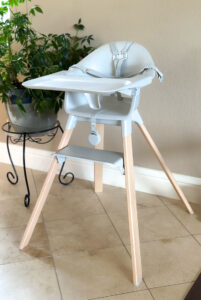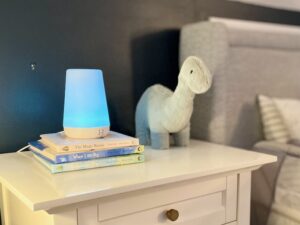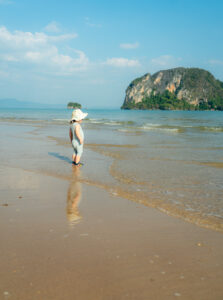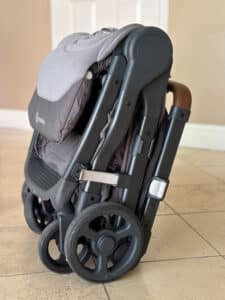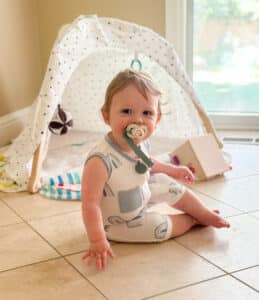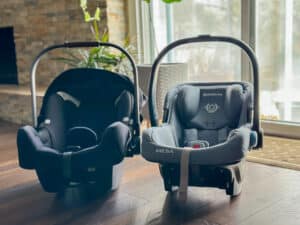The Best Baby Hiking Backpack Carriers (We Tested Them All!)
As an avid hiker, before, I became a parent, I knew that I still wanted to hit the trail as often as possible after having my baby. Beginning at his third month of age, our first hike involved a soft carrier before graduating to one with a frame, which provides more support and better weight distribution.
We’ve tried several kinds and brands at Parenthood Adventures, and these are our favorite hiking backpack carriers for babies and toddlers:
The Winning Hiking Backpack Carrier Lineup:
- Best All Around: Deuter Kid Carrier Pro
- Best for Travel/Flying: Osprey Poco LT
- Best for Backpacking: Osprey Poco Plus
- Best on a Budget: Besrey Baby Backpack Carrier
- Best Soft Carrier: Artipoppe Zeitgeist
- Best Soft Carrier for Hot Hikes: Ergobaby Omni 360 Mesh
Deuter Kid Carrier Pro
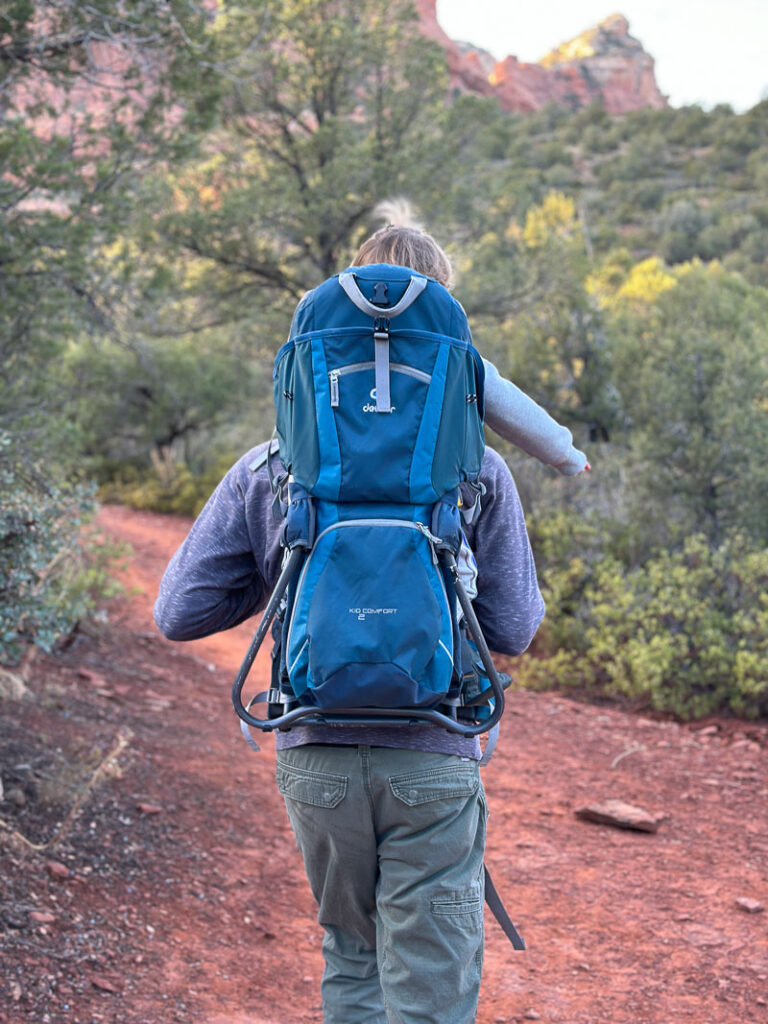
Specs:
- 14L capacity
- Weighs 7lb 2oz
- Big sun shade
- Comes with rain cover
- Costs $385 new
What I Dig:
In the world of kid carriers, the Deuter Kid Comfort Pro takes the lead in 2024, offering a sublime fusion of comfort, safety, and top-tier build quality. Strapping on this pack, I felt Deuter’s renowned suspension system that makes their backpacks famous. The robust metal frame and adjustable back helps us shoulder the weight of my ever-growing and spirited little one, while the padded hipbelt and mesh backpanel weave a nice blend of support and ventilation.
Deuter’s expertise shines through in their consideration of child comfort, true to the name. A secure five-point harness, though not as fuss-free as the Osprey Poco’s, assures a snug fit. The side entry option is a thoughtful touch, making it easy to get my toddler in. The tall back, supportive sides, and plush, washable front pad create a cozy cocoon for mid-hike naps. I really wish the Osprey Poco had a front pillow cushion as well. It’s the biggest reason why this is my number one after renting it for a week on a recent trip in Sedona. Read my full Deuter Kid Comfort Pro review.
What Gives Pause:
The Deuter Kid Comfort Pro has sufficient storage for most day trips, although it falls slightly short of the Osprey Poco lineup in this department. It’s harder to buckle, and though the sun shade is larger than the Osprey, it’s also more prone to wind issues. This carrier, though taller in the back and more comfortable when my baby is sleeping, is too tall to fit into a suitcase. It’s also on the pricey side, though you can find great secondhand deals.
Osprey Poco LT
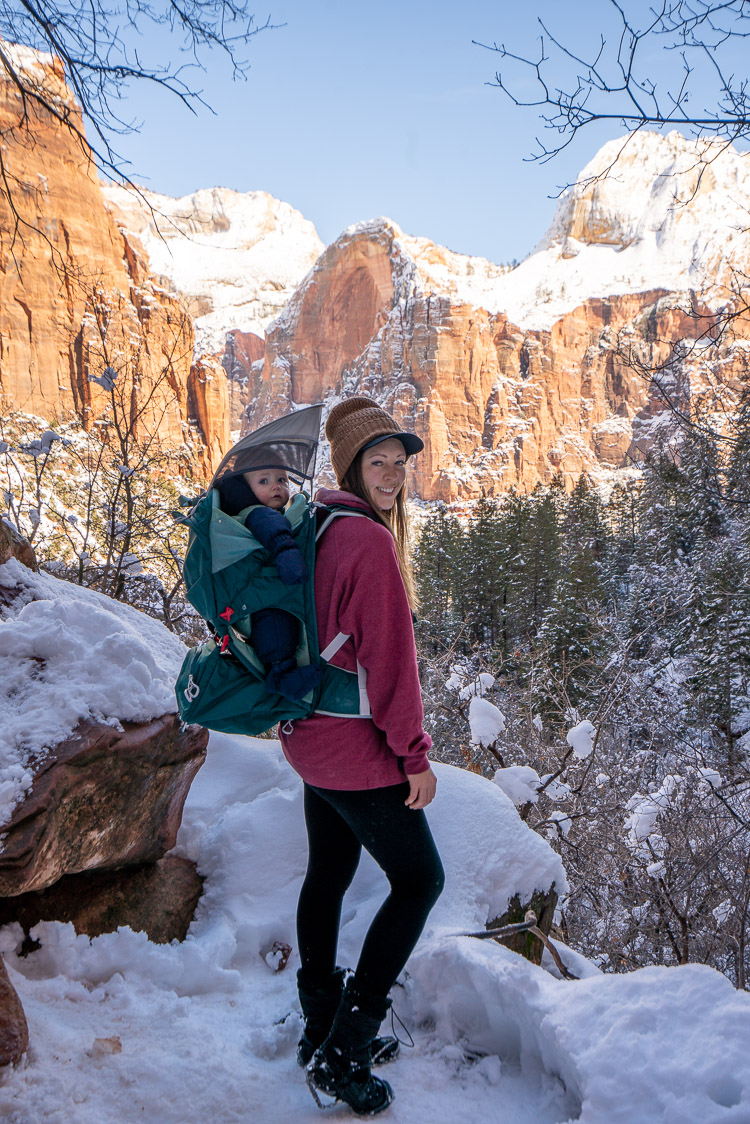
Specs:
- 21L capacity
- Weighs 5lb 2oz
- Sun shade
- Costs $299 new
What I Dig:
Two things make this carrier great – its small size and its weight. Osprey’s response to the Deuter Kid Comfort Active, the smaller version of the Kid Comfort Pro, comes in the form of the Poco LT. This is the lightest member of the Poco family. Crafted with an eye for packability and simplicity, the Poco LT boasts a slender frame and a compact profile that folds nearly flat—which makes it perfect for flying. Though it takes up most of one side of a large suitcase, it’s one of the only carriers that’s actually small enough to fit and therefore our go-to.
Weighing just over 5 pounds, it takes away meaningful weight from in our case an already heavy toddler, undercutting the Kid Comfort Active by a considerable 13 ounces and pro by 2 pounds! Osprey doesn’t skimp on essential features either, preserving generous storage (21 liters in total), hydration reservoir compatibility, and a deployable sunshade. For all of these reasons, it’s the one we own and use for our travels and day hikes with my baby.
What Gives Pause:
However, simplicity comes at a cost, and Osprey’s streamlining of the Poco pack takes a toll on extended trail comfort. I wish it had the nice chin pillow that the Deuter Kid Comfort Pro has. It looks so darn uncomfortable when my son falls asleep in this one. Creature comforts like stirrups, particularly useful for older kids and extended hikes, are notably absent, and the exterior pocket layout remains rather basic. In essence, the Poco LT may not be the jack-of-all-trades that our top picks represent, but it stands out as a great option for travel scenarios. Read my full Osprey Poco LT review.
Osprey Poco Plus
Specs:
- 26L capacity
- Weighs 7 lb. 14 oz.
- Sun shade
- Costs $395 new
What I Dig:
If the Osprey Poco LT is lacking too many of the extras you’re hoping for, then the Osprey Poco Plus is your answer. It has an easier harness to buckle than the Deuter, which buckles at the waist, by putting the buckles behind your little one’s shoulders. I like this setup so much better, and the Poco LT has it as well.
It has so much storage space, it takes my #1 spot for longer backpacking trips where you’ll need to carry a lot more gear with you. Although the Deuter Kid Carrier pro gives you a bit more space with the front pack, it’s nicer, IMHO, to be able to put it at the base of the back instead and have your chest free from baggage.
This one also comes with the foot stirrups missing from the Poco LT, which can be a more comfortable ride for older toddlers.
What Gives Pause
It’s heavier than the Poco LT by a whopping 2lbs, 12 oz. It may not seem like much, but when you’re on a steep uphill on day two of a trek, every gram matters. Still, it’s got superior padding, a great design, and plenty of storage to make up for the extra weight.
Besrey Baby Backpack Carrier

Specs:
- 26L capacity
- Weighs 7 lb. 14 oz.
- Sun shade
- Costs $157 new
What I Dig
This #1 seller on Amazon is the most popular budget option and provides many of the features that the other backpacks do, including a sun shade, nice big hip belt, similar child seat to the Deuter, and an open back for ventilation. Both sides open for easier buckling and getting your kiddo in, and there’s a side pocket for milk, and straps on the back to fasten extra items to the outside.
It’s also nice and lightweight, only a few ounces more than the Osprey Poco LT. At $157, it’s less than half of many of the carriers on this list.
What Gives Pause
When I tried it, it felt noticeably less sturdy than the Osprey or the Deuter, and didn’t have quite as much padding for the kiddo. The other two brands have been in the game for a long time, and it shows when comparing them. The stirrups are made from plastic, which isn’t ideal, and the biggest issue with this carrier is the weight limit of 40lbs including gear, giving it a much shorter life than the others on this list.
In the long run, a nicer, sturdier pack that can last through several kids is the better way to go, IMHO. Name brands are easier to sell secondhand, effectively making them cheaper or the same price in the long run.
Artipoppe Zeitgeist
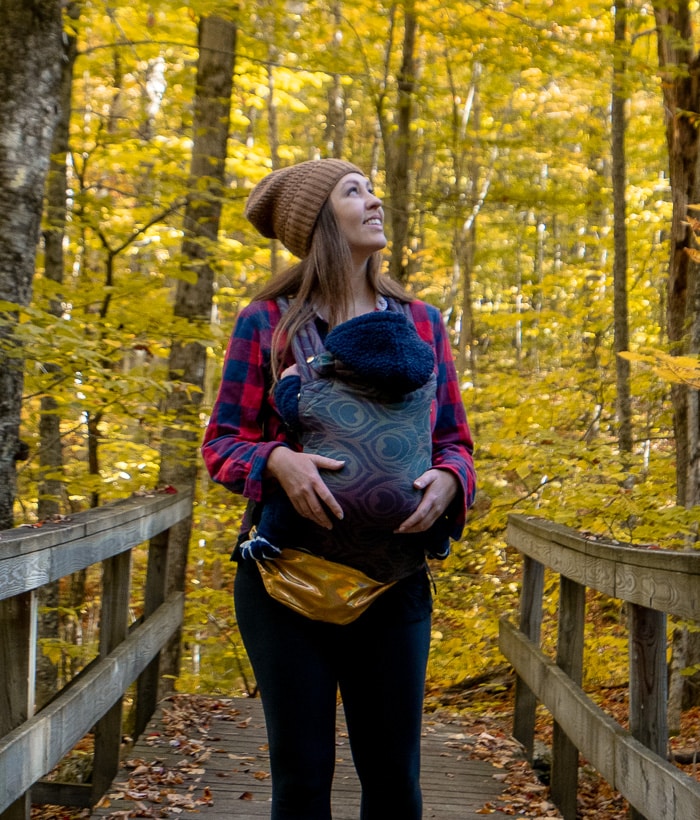
Specs:
- Front, outward facing, and back carry compatible
- Folds up small
- No sun shade
- Costs $370+ new
What I Dig
While your baby is too young to hold their head up for a hiking backpack carrier, you’ll still need to rely on a soft carrier. I loved the fabric and the fit of Artipoppe.
Although it’s more of a designer carrier than what I’d typically think of for getting sweaty and hiking, after trying MANY different kinds of carriers, I just liked this one the best. The fabrics are soft for baby, and I like the way it crosses in the back to take pressure off of the shoulders. Although you can carry kiddos up to 45lbs in this carrier, I’d definitely opt for the Osprey or the Deuter on hikes once your baby can hold their head up on their own, around six months.
That said, when we’re traveling, we often just bring this carrier since it’s so easy to pack and is lightweight.
What Gives Pause
I wish the forward facing mode didn’t have an insert needed to make it work. It’s so awkward to use, and doesn’t seem that comfy for my baby (and it’s not for me, either). If you know your baby will want to face forward, consider a hiking backpack carrier or compare the Artipoppe to the Ergobaby.
It’s also an expensive carrier, but you can find them secondhand quite easily.
Ergobaby Omni 360 Mesh
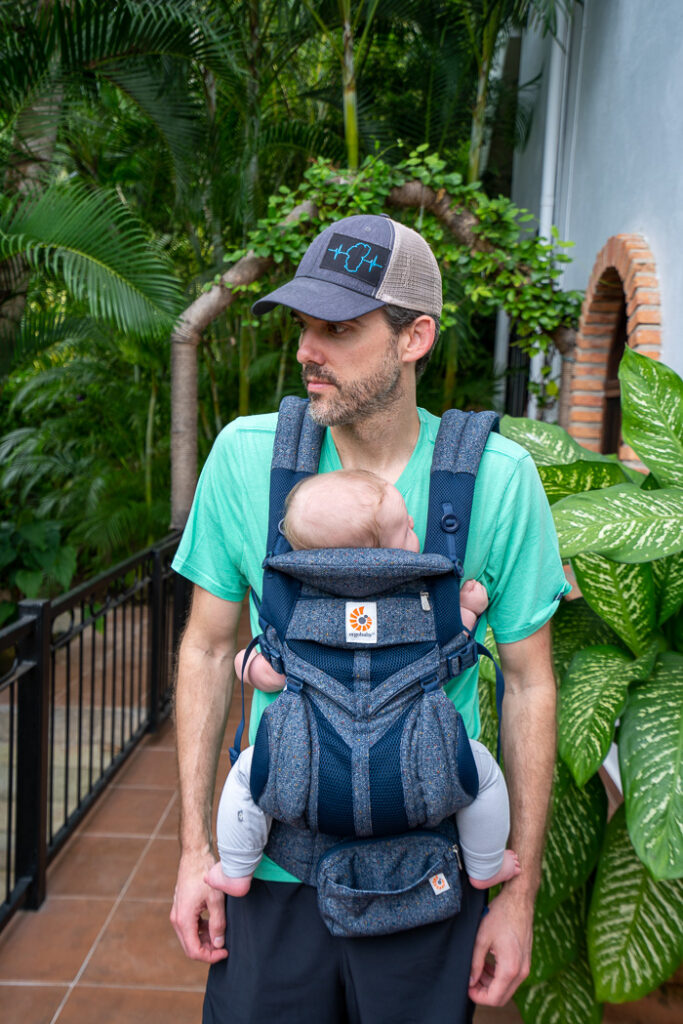
Specs:
- Front, outward facing, and back carry compatible
- Folds up small
- small sun shade
- Costs $250+ new
What I Dig
The Ergobaby 360 stands out as the classic choice for soft carriers, boasting a snug waistband and a variety of carrying options that don’t require inserts. I love how easy it is to just slide the hip pads for baby to make it outward facing in a second.
The Ergobaby earns extra points for its compact size, a feature that makes it a breeze to carry around, unlike the bulkier child carriers in the market. I also like it better for hikes I know are going to be sweaty, since the mesh makes it breathable. It has a little pocket in the front, and a zip out sun shade that would probably annoy a toddler, but works in a pinch for a baby. Read my full Ergobaby review.
What Gives Pause
The absence of a frame system makes it less forgiving on long journeys, lacking the plush comfort and handy exterior pockets found in more dedicated hiking packs. Keeping the baby close restricts your freedom of movement, and breaking a sweat is almost inevitable during vigorous hikes (even with the mesh construction lending a helping hand, it still tends to run warmer than a hiking backpack carrier would).
It’s also nowhere near as soft as the Artipoppe fabrics, and I feel I have to put my son in pants if we’re going to use it since the mesh isn’t soft.
Final Thoughts on the Best Baby Hiking Carrier
For us, it’s really between the Deuter Kid Carrier Pro and the Osprey Poco LT. They kind of serve different purposes, with the Deuter making more sense for hikes that we can drive to, and the Osprey Poco LT, making more sense for traveling, since it is small enough to fit into a suitcase and is lighter weight.
If I was mainly doing hikes around home, I would probably go for the Deuter, since it seems like a more comfortable ride for my son, however, since we travel and fly a lot, we are sticking with the Osprey for now.
*Some links in this post are affiliate links that support this site at no extra cost to you when you purchase through them. We only recommend products we use and love.


